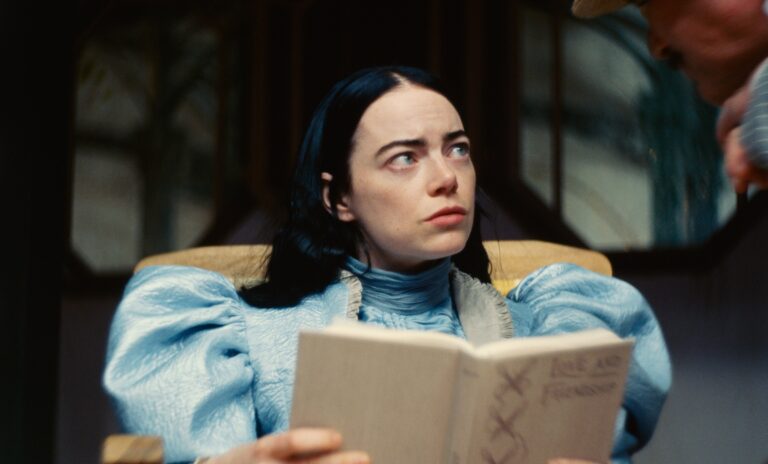Poor Things (2023 | USA, Ireland, UK | 141 minutes | Yorgos Lanthimos)
In a relentlessly inventive take on the Frankenstein myth, a sexually-insatiable experiment stumbles out from a Goldbergian laboratory into a vibrant Ozlike world. Based on Alasdair Gray’s illustrated novel, Yorgos Lanthimos tells a coming-of-age story unlike any other, set amid some of the richest and most dazzling production design captured on film this year. With tremendous and daring performances across the stellar cast, Poor Things earns a must-see spot for holiday season moviegoers and well-deserved recognition on year-end lists and award nominations.
Set in a non-specific, retrofuturistic Europe of the early twentieth century, our good doctor is prominent surgeon Godwin “God” Baxter. Portrayed by Willem Dafoe, whose profound performance can’t be masked even by layers of prostheses and pronounced accent work, “God” is himself the result of being his own experimentalist father’s cruel and bizarre scientific interventions. They’ve left him with deep facial scars, an unlikely digestive system, and an ill-considered devotion to scientific rigor.
His creation though, and the film’s centerpiece, is one born from a twisted act of mercy. As Bella Baxter, Emma Stone plays a young woman whose chronological and biological ages are outlandishly out of sync for reasons we’ll only come to appreciate later. When we first meet her in the film’s evocative black and white opening act, she has no language and poor motor skills. Driven by a chaotically violent curiosity about her surroundings, she’s given free rein of a grand manor that’s well appointed with comforts, curiosities, and an amusing menagerie of chimeric creatures. It’s a funny and fearless physical performance, itself an ingenious creation on the part of Emma Stone, who embodies Bella’s initial childlike frustrations and tracks her developing intellectual curiosity as unbound from societal constraints. As she rapidly matures, soon the likes of hybrid duck-dogs, grotesque autopsies, and mountains of very stimulating meals, aren’t nearly enough to satisfy her voracious and seemingly boundless interests in what lies beyond.
Enter a hilarious louche of a lawyer played with perfect pitch by Mark Ruffalo. He’s so fascinated by a bit of contract law that he breaks Bella out of her gothic monochrome home and into the soaring vibrant colors of the richly-realized world outside its walls. Lanthimos’s Lisbon sparkles with the delights of custard pastries and countless hours spent in the throes of passion (“furious jumping” in Bella-ese). As their sensual vacation proceeds around the continent on a whimsical steamship cruise, Bella’s development and understanding of the world soon outpaces even her debaucherous companion. Ruffalo plays his frustration to and jealousy to uproariously childlike effect, with his tantrums and overreactions tilting the tale further on its axis to bawdily unconventional liberation abroad.
The wide-angle camerawork and mannered dialogue are everything we’ve come to expect from the ongoing creative partnership of Lanthimos, screenwriter Tony McNamara, and producer/star/muse Emma Stone. They track Bella’s grand tour of the Continent, with each port of call from Alexandria to Paris widening the lens by which its heroine comes to understand both herself and the broader world. Like another box office sensation this year about a doll coming to terms with the parameters of her own existence, Bella spends the film coming to understand “what was she made for.” Bella’s outfits, however, might be even better than anything from the Barbie Cinematic Universe thanks to the degree to which designer Holly Waddington and crew outdo themselves. With every passing iteration of her evolving style, she navigates growing intellectual development and an understanding of bodily autonomy, with contradictions colliding in dazzlingly unconventional fashion.
Filled with laugh-out-loud moments of physical comedy, clever constructions of language, nonstop visual delights, and a truly outrageous and kaleidoscopic array of sexual awakenings, Poor Things a triumph for the director. For all of its absurdities, this may be Lanthimos’s warmest-hearted and most accessible film. As much as it’s a culmination of him, it’s also a triumph for Emma Stone, whose portrayal of the discovery of the pleasures and pains of humanity is never short of utterly rapturous.
Poor Things arrives in wide release on December 22, but opens in select Seattle on December 14th including at the SIFF Egyptian.
A previous version of this review ran as part of our coverage of the Telluride Film Festival, where Poor Things had its US Premiere.



